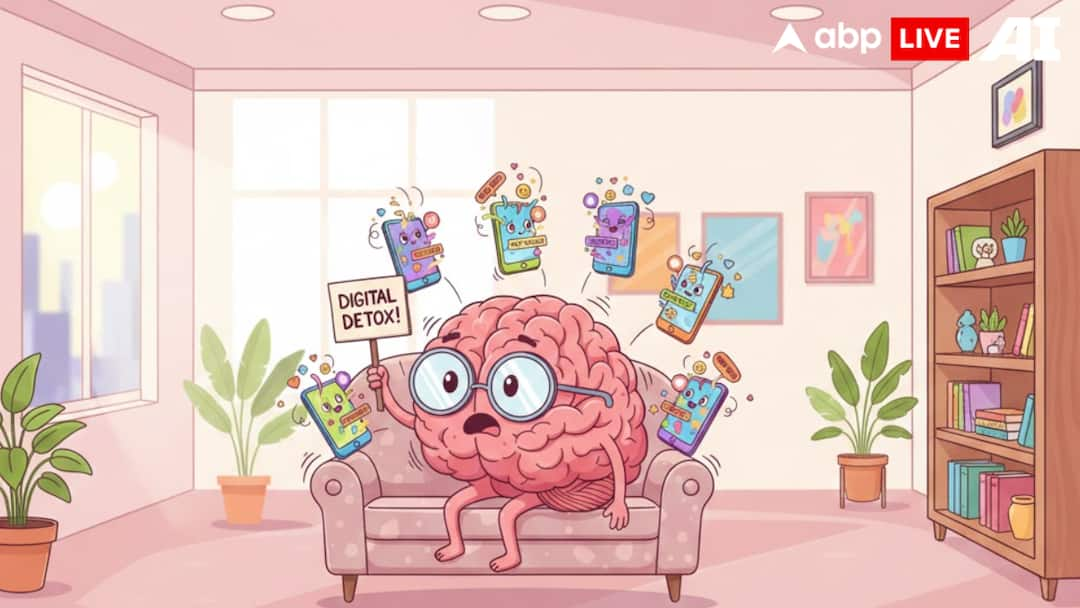In a hyperconnected world where smartphones rarely leave our hands, a new concern has emerged, digital dementia. Though the term sounds dramatic, experts say the symptoms linked to excessive screen exposure are very real. Rising attention issues, disrupted sleep cycles, memory lapses and emotional distress are being increasingly observed across age groups. And according to specialists, much of it stems from how the brain responds to constant digital stimulation.
ALSO READ: Can’t Stop Scrolling? You Might Have Popcorn Brain, Say Experts
How Screens Affect Attention, Memory, And Focus
Dr. Jayendra Yadav, Consultant Neurologist, Fortis Hiranandani Hospital, Vashi, explains that “digital overexposure is when people spend excessive amounts of time engaging with screens.” Multitasking across apps, endless notifications and short bursts of focus create a state of information overload that “can lead to fatigue and reduced critical thinking.”
He warns that this constant jumping between platforms weakens our ability to engage in deep focus. “Constant app switching and notifications can impair sustained attention,” he notes, adding that the brain’s natural rhythm of focus and rest gets disrupted. Over time, this impacts how memories are formed, integrated and retained.
Dr. Kedar Tilwe, Consultant, Psychiatrist, Fortis Hospital, Mulund and Fortis Hiranandani Hospital, Vashi, adds, “constant unregulated exposure to digital stimuli may result in attention difficulties, sleep-wake cycle disturbances, concentration issues, cognitive blunting and mood disturbances.” This happens because digital platforms trigger repeated dopamine surges, conditioning the brain to crave more stimulation.
When Does It Become A Disorder? Experts Explain The Warning Signs
One of the biggest red flags, according to Dr. Tilwe, is when screen use turns compulsive. He explains that digital dependency becomes harmful when “constant digital activity establishes itself into compulsive habitual loops… at tremendous cost to personal, professional and social life.”
It may show up as relationship strain, work issues, academic decline or even neglecting one’s own health. The associated overstimulation can trigger “severe anxiety, forgetfulness and even agitation,” while increased impulsivity may lead to “rash decisions, impaired judgment and higher risk of substance abuse.”
Meanwhile, Dr. Yadav says the consequences extend beyond behaviour. Reduced physical activity caused by prolonged screen time affects brain health because exercise supports neuroplasticity. He also highlights that “late-night screen time, especially with blue light exposure, can interrupt circadian rhythms,” which is linked to poor cognitive performance and long-term neurodegenerative risks.
Is Digital Damage Reversible?
Experts say the symptoms are reversible if addressed early. Dr. Tilwe stresses that “conscious efforts to reduce the digital exposure can lead to a significant reduction in the symptoms.”
His recommended steps include:
- Limiting the number of screens and screen time.
- Practising a digital detox for at least 30–60 minutes daily.
- Establishing screen-free zones, “especially the dining table and bedroom”
- Replacing screen time with outdoor hobbies and real-world connections.
- Incorporating relaxation techniques such as yoga and mindfulness.
Dr. Yadav echoes the importance of sleep hygiene and reducing late-night screen use, reminding that poor rest directly impacts cognitive performance and emotional regulation.
If left unchecked, the brain’s constant need for digital stimulation could reshape how we think, focus and connect with the world. But with expert-backed strategies, awareness and intentional habits, reclaiming cognitive balance in the digital age is entirely achievable.
[Disclaimer: The information provided in the article is shared by experts and is intended for general informational purposes only. It is not a substitute for professional medical advice, diagnosis, or treatment. Always seek the advice of your physician or other qualified healthcare provider with any questions you may have regarding a medical condition.]
Check out below Health Tools-
Calculate The Age Through Age Calculator


